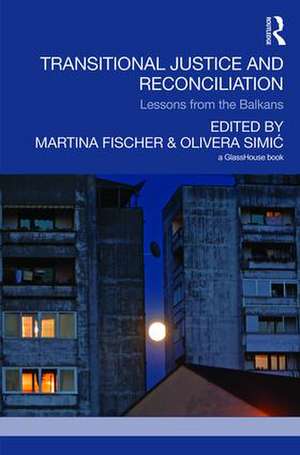Transitional Justice and Reconciliation: Lessons from the Balkans: Transitional Justice
Editat de Martina Fischer, Olivera Simicen Limba Engleză Hardback – 17 noi 2015
Two decades after the wars, societies in Bosnia, Serbia and Croatia – albeit to different degrees – are still facing the legacies of the wars of the 1990s on a daily basis. Reconciliation between and within these societies remains a formidable challenge, given that all three countries are still facing unresolved disputes either at a cross-border level or amongst parallel societies that persist at a local community level.
This book engages scholars and practitioners from the regions of former Yugoslavia, as well as international experts, to reflect on the achievements and obstacles that characterise efforts to deal with the past. Drawing variously on empirical studies, theoretical discussions, and practical experience, their contributions offer invaluable insights into the complex relationship between transitional justice and conflict transformation.
| Toate formatele și edițiile | Preț | Express |
|---|---|---|
| Paperback (1) | 434.41 lei 6-8 săpt. | |
| Taylor & Francis – 18 mai 2017 | 434.41 lei 6-8 săpt. | |
| Hardback (1) | 1003.43 lei 6-8 săpt. | |
| Taylor & Francis – 17 noi 2015 | 1003.43 lei 6-8 săpt. |
Din seria Transitional Justice
- 9%
 Preț: 936.85 lei
Preț: 936.85 lei -
 Preț: 330.37 lei
Preț: 330.37 lei -
 Preț: 189.55 lei
Preț: 189.55 lei - 15%
 Preț: 289.21 lei
Preț: 289.21 lei - 18%
 Preț: 999.82 lei
Preț: 999.82 lei -
 Preț: 413.33 lei
Preț: 413.33 lei -
 Preț: 446.37 lei
Preț: 446.37 lei - 18%
 Preț: 1000.27 lei
Preț: 1000.27 lei -
 Preț: 449.41 lei
Preț: 449.41 lei - 26%
 Preț: 847.73 lei
Preț: 847.73 lei - 14%
 Preț: 312.77 lei
Preț: 312.77 lei - 19%
 Preț: 268.10 lei
Preț: 268.10 lei -
 Preț: 409.48 lei
Preț: 409.48 lei -
 Preț: 413.33 lei
Preț: 413.33 lei - 18%
 Preț: 1057.57 lei
Preț: 1057.57 lei -
 Preț: 413.33 lei
Preț: 413.33 lei -
 Preț: 489.26 lei
Preț: 489.26 lei -
 Preț: 389.38 lei
Preț: 389.38 lei -
 Preț: 487.37 lei
Preț: 487.37 lei -
 Preț: 413.33 lei
Preț: 413.33 lei -
 Preț: 469.34 lei
Preț: 469.34 lei -
 Preț: 407.57 lei
Preț: 407.57 lei -
 Preț: 462.60 lei
Preț: 462.60 lei -
 Preț: 434.41 lei
Preț: 434.41 lei -
 Preț: 485.46 lei
Preț: 485.46 lei -
 Preț: 439.43 lei
Preț: 439.43 lei - 18%
 Preț: 1117.43 lei
Preț: 1117.43 lei - 18%
 Preț: 1060.25 lei
Preț: 1060.25 lei - 26%
 Preț: 764.20 lei
Preț: 764.20 lei -
 Preț: 444.62 lei
Preț: 444.62 lei - 18%
 Preț: 1062.62 lei
Preț: 1062.62 lei
Preț: 1003.43 lei
Preț vechi: 1223.70 lei
-18% Nou
Puncte Express: 1505
Preț estimativ în valută:
192.03€ • 208.52$ • 161.30£
192.03€ • 208.52$ • 161.30£
Carte tipărită la comandă
Livrare economică 23 aprilie-07 mai
Preluare comenzi: 021 569.72.76
Specificații
ISBN-13: 9781138851696
ISBN-10: 1138851698
Pagini: 286
Ilustrații: 7
Dimensiuni: 156 x 234 x 20 mm
Greutate: 0.54 kg
Ediția:1
Editura: Taylor & Francis
Colecția Routledge
Seria Transitional Justice
Locul publicării:Oxford, United Kingdom
ISBN-10: 1138851698
Pagini: 286
Ilustrații: 7
Dimensiuni: 156 x 234 x 20 mm
Greutate: 0.54 kg
Ediția:1
Editura: Taylor & Francis
Colecția Routledge
Seria Transitional Justice
Locul publicării:Oxford, United Kingdom
Public țintă
Postgraduate and UndergraduateCuprins
Introduction: Struggling with the Legacy of War - Croatia, Serbia and Bosnia-Herzegovina, 1995-2015, Martina Fischer Part 1: Legal Justice and the Need for Restorative Approaches 1. Dealing with the Past from the Top Down and Bottom Up - Challenges for State and Non-State Actors, Martina Fischer 2. The ICTY after 20 Years of Experience – Assessments from an Insider’s View, Klaus Hoffmann 3. The Micro Legacy of the ICTY in Croatia – A Case Study of Vukovar, Tamara Banjeglav 4. Rape, Silence and Denial, Olivera Simić 5. Political Memory as an Obstacle to Justice in Serbia, Croatia and Bosnia-Herzegovina, Jelena Subotić Part 2: Obstacles and Prospects for Reconciliation 6. Dealing with the Past in Serbia - Achievements in the Past 20 Years, Vesna Nikolić-Ristanović & Sanja Ćopić 7. Young Adults’ Perspective of Social Reconstruction in Three Post-War Communities in Croatia and Bosnia-Herzegovina, Dinka Čorkalo Biruški & Dean Ajduković 8. Educating Citizens in Bosnia-Herzegovina - Experiences and Contradictions in Post-War Education Reform, Briony Jones 9. Discrimination: From Construction to Deconstruction - An Essay on the Prospects of Reconciliation in Bosnia-Herzegovina 20 Years after Dayton, Miodrag Živanović 10. Economic Development and Perspectives for Reconciliation, Will Bartlett Conclusion: Dealing with Past Violence as a Long-Term Challenge - Lessons from the Balkans, Martina Fischer
Descriere
Two decades after the wars, societies in Bosnia, Serbia and Croatia – albeit to different degrees – are still facing the legacies of the wars of the 1990s on a daily basis. Reconciliation between and within these societies remains a formidable challenge, given that all three countries are still facing unresolved disputes either at a cross-border level or amongst parallel societies that persist at a local community level. This book engages scholars and practitioners from the regions of former Yugoslavia, as well as international experts, to reflect on the achievements and obstacles that characterise efforts to deal with the past. Drawing variously on empirical studies, theoretical discussions, and practical experience, their contributions offer invaluable insights into the complex relationship between transitional justice and conflict transformation.















